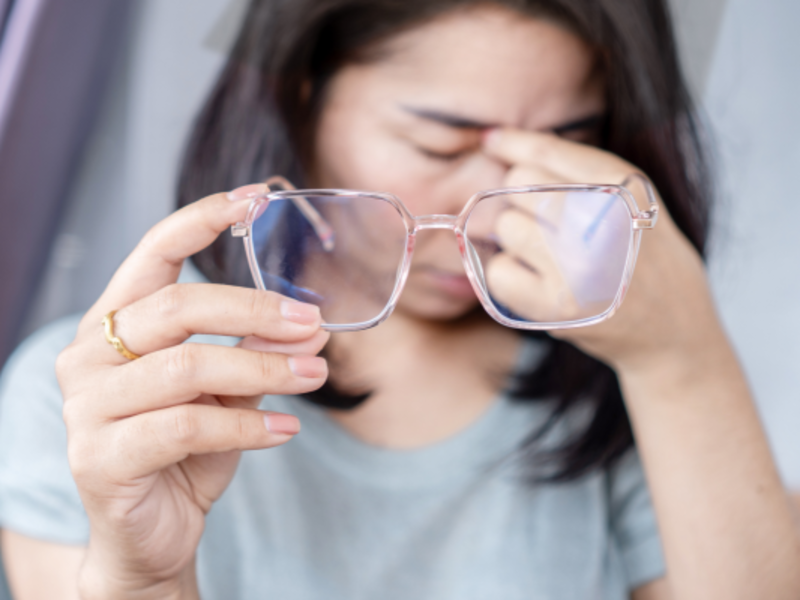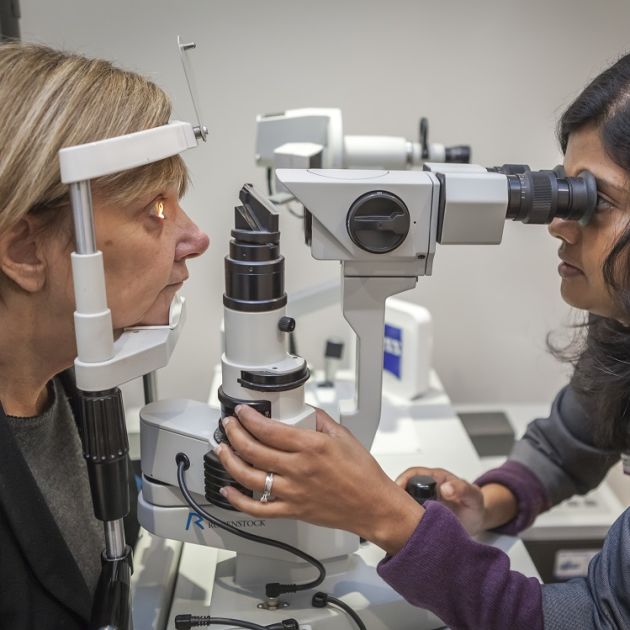What Causes Blurred Vision
Jan 10, 2024 in Eye Care

Do you keep finding yourself rubbing your eyes, blinking, or squinting, to clear your vision? If you have trouble focusing and find your vision blurry, you might just chalk it up to age or maybe needing new glasses. But it can be a sign of other underlying health conditions. Usually your blurred vision will clear up with treatment – phew. But remember that sudden changes to your eyesight aren’t normal so if that happens, you should see an eye specialist right away.

What Is Blurred Vision?
Your eyesight should be crisp and clear. Your eyes work together to create a nice, crisp image of the world around you. If there is something wrong with one (or both), your vision can go blurry and out of focus. Blurred vision means that you’re not able to see things clearly. Sometimes squinting will help.
You might experience blurred vision in both eyes or just in one eye, depending on what causes it. Sometimes everything you look at will be blurry, while other times just part of your field of vision will be blurred.
Possible Causes
Blurry vision is a common symptom with many potential causes, including very common ones like short-sightedness, and dry eyes. But there are some more serious reasons for blurred vision which your doctor will be able to diagnose.
Common reasons for blurry vision include:
- difficulty focusing your eyesight, such as with short-sightedness or long-sightedness
- astigmatism (when the surface of the eye isn’t curved properly)
- presbyopia (when your eyes find it harder to focus at nearby objects as you age)
- dry eye syndrome
- cataracts
- glaucoma
- damage to the cornea
- age-related macular degeneration
- an eye infection
- problems with the retina, such as diabetic retinopathy
- an injury to the eye
Blurred vision can also be a symptom of another medical condition, such as:
- diabetes
- high blood pressure
- migraine
- stroke
- head injury
- low blood sugar
- pre-eclampsia (high blood pressure) if you are pregnant
- inflammatory conditions
- autoimmune conditions
- multiple sclerosis
- brain tumour
- Parkinson’s disease
Sometimes, blurred vision can be a side effect of medicines that you may be taking. If you notice a sudden change in your vision, see a doctor as soon as possible.
Eye Conditions
Here are some common eye conditions that can can cause blurry vision:

Cataracts
A cataract is a cloudy area in the lens of your eye (the clear part of the eye that helps to focus light). They are very common as you get older. Over time they become bigger and cause blurry vision, but as they grow, they can obscure the vision completely so having these assessed when you notice a change is important as you may benefit from a procedure to remove the cataract.
Glaucoma
Glaucoma is a common eye condition in which the optic nerve (the nerve that connects the eye to the brain), becomes damaged. This damage is usually caused by a buildup of pressure inside the eye. If not diagnosed and treated early, glaucoma can lead to permanent loss of vision.
It tends to start off mildly on the edges of your vision and slowly get worse over time so it’s difficult to catch. most people don’t realise they have glaucoma at first and it only gets picked up during a routine eye test. If you notice blurred vision, or seeing rainbow-coloured circles around bright lights, get your eyes checked.
Macular Degeneration
Age-related Macular Degeneration (AMD) is a problem with the central part of the retina, called the macula, causing you to lose your central vision. You cannot see fine details, whether you are looking at something close or far away.
There are two types of macular degeneration – wet and dry. Dry AMD is when parts of the macula get thinner with age and tiny deposits, called drusen, form under the central retina. Wet AMD is less common than dry AMD but is much more serious. Wet AMD is when new, abnormal blood vessels grow underneath the retina. They may leak blood or other fluids, causing scarring of the macula. You lose vision faster with wet AMD than with dry AMD but you may be suitable for sight saving treatment. Your optician will be able to spot AMD and give you tips on how to treat it and prevent it from progressing.
Medical Conditions
Eye health is not just isolated to the eyes. Other health conditions can also affect your eye health so if you have any of the following, make sure you’re regularly getting your eyes checked.

Diabetes
Diabetes poses an extra risk to developing diabetic retinopathy. Over time, high blood sugar can end up damaging the tiny blood vessels in your retina – the part of the eye that senses light. That damage can lead to swelling in the macula, new and unwanted blood vessels growing in the eye, and bleeding inside the eye.
Along with blurry vision, diabetic eye disease can also cause “floating” spots in your field of vision and can result in a permanent loss of vision. So if you’re diabetic, it’s important to get your eyes routinely checked once a year.
Hypertension
Hypertension, also known as high blood pressure, can cause issues with your eyes if left untreated. Hypertensive retinopathy happens when your high blood pressure causes the blood vessels in your retina to bleed or narrow and become blocked, reducing blood flow. The condition may also trigger swelling of the retina and optic nerve and could cause white spots to appear on the retina.
When Should I Contact My Doctor?
You should go to an eye specialist emergency room if you have any sudden blurred vision or loss of vision. If you’ve been injured, such as falling and hitting your head, or if you have any other symptoms of stroke, such as difficulty speaking or moving then contact the emergency services for further advice.
What Are the Treatment Options for Blurred Vision?
Glasses, contact lenses, lifestyle changes, medications, and surgery are the potential methods used to treat blurred vision. The treatment you undergo will depend on what the cause for your blurry vision is and how severe it is.
Medication can be used to treat conditions such as glaucoma, while surgery is the most common way to correct vision issues due to cataracts.

Eyeglasses and contact lenses
For those who suffer from short or long-sightedness and astigmatism, glasses or contact lenses are the most common treatments. The lenses in your glasses can also have special treatments or tints to enhance your vision and visual comfort.
Because your eyesight is always changing, it’s a good idea to get your eyes tested and prescription updated on a regular basis.
Is it Possible to Prevent Blurred Vision?
You won’t be able to prevent blurred vision at all times – some people are genetically inclined to develop certain conditions that can affect eyesight. But you can help yourself by developing and maintaining a healthy lifestyle that includes nutritious foods and physical activity to keep your blood pressure down. Make sure to have regular eye exams to catch issues early.
Conclusion
There are many things that can cause blurry vision, from something super common like long-sightedness to more unusual complications like wet AMD. You only get one pair of eyes in your life so it’s important to take care of them. Making sure your overall health is good can make sure you don’t develop certain eye conditions associated with issues like diabetes and hypertension. Additionally, regular check ups at an opticians will catch any issues early, keep your glasses prescription up to date to help reduce eye strain and recommend steps to slow or prevent eye conditions getting worse. Don’t forget that if you notice a sudden change in eyesight, including suddenly being blurry, go to an eye specialist as soon as possible. Book your eye test today.

